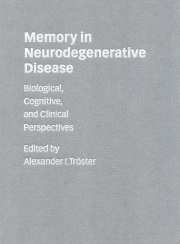Book contents
- Frontmatter
- Contents
- List of contributors
- Preface
- PART I Biological perspectives
- PART II Cognitive perspectives
- PART III Clinical perspectives
- 14 Biological and psychosocial risk factors for dementia and memory loss
- 15 Cross-cultural issues in the neuropsychological assessment of neurodegenerative disease
- 16 Psychometric issues in the clinical assessment of memory in aging and neurodegenerative disease
- 17 The role of memory assessment in the preclinical detection of dementia
- 18 Clinical differentiation of memory disorders in neurodegenerative disease
- 19 The impact of depression on memory in neurodegenerative disease
- 20 Preserved cognitive skills in neurodegenerative disease
- 21 Drug treatment of cognitive impairment in neurodegenerative disease: rationale, current experience and expectations for the future
- 22 Surgical interventions in neurodegenerative disease: impact on memory and cognition
- 23 Memory dysfunction in neurodegenerative disease: ethical and legal issues
- 24 Memory in neurodegenerative disease: clinical perspectives
- Index
15 - Cross-cultural issues in the neuropsychological assessment of neurodegenerative disease
from PART III - Clinical perspectives
Published online by Cambridge University Press: 23 November 2009
- Frontmatter
- Contents
- List of contributors
- Preface
- PART I Biological perspectives
- PART II Cognitive perspectives
- PART III Clinical perspectives
- 14 Biological and psychosocial risk factors for dementia and memory loss
- 15 Cross-cultural issues in the neuropsychological assessment of neurodegenerative disease
- 16 Psychometric issues in the clinical assessment of memory in aging and neurodegenerative disease
- 17 The role of memory assessment in the preclinical detection of dementia
- 18 Clinical differentiation of memory disorders in neurodegenerative disease
- 19 The impact of depression on memory in neurodegenerative disease
- 20 Preserved cognitive skills in neurodegenerative disease
- 21 Drug treatment of cognitive impairment in neurodegenerative disease: rationale, current experience and expectations for the future
- 22 Surgical interventions in neurodegenerative disease: impact on memory and cognition
- 23 Memory dysfunction in neurodegenerative disease: ethical and legal issues
- 24 Memory in neurodegenerative disease: clinical perspectives
- Index
Summary
INTRODUCTION
As we approach the year 2000, research has increasingly become an international venture. Modern technology offers clinicians and researchers the possibility of communicating and comparing the results of their investigations almost immediately through globally-linked telecommunication networks.This development, which will undoubtedly increase in the coming decades, will not only provide new and exciting opportunities but will also raise new questions about the comparability and generalizability of research findings across international borders.
The purpose of this chapter is to discuss conceptual and methodological issues involved in cross-cultural research pertaining to neurodegenerative diseases. The chapter focuses on dementia and the cross-cultural issues related to its diagnosis. As neuropsychological assessment is a critical part of the diagnostic process, we address the utilization of dementia screening instruments in a cross-cultural context. As similar issues arise in investigations comparing neuropsychological functioning in different ethnic groups (Olmedo 1981), cross-ethnic studies are also addressed.
METHODOLOGICAL AND CONCEPTUAL ISSUES
Cross-cultural research in neurodegenerative diseases has primarily been carried out in an attempt to compare prevalence rates of these diseases to discover possible risk and/or protective factors (i.e. genetic and environmental) (Katzman 1987; Chang et al. 1993). In a literature review of 47 prevalence studies on dementia from Asia, Europe, North America and South Africa, Jorm et al. (1987) identified age as a consistent risk factor for dementia. A relationship between age and prevalence rate was found across all studies, with the prevalence rate doubling approximately every 5 years after the age of 60 years. Sixteen of the 47 studies had data appropriate for an analysis of the relative frequency of dementia of the Alzheimer type and multi-infarct dementia.
- Type
- Chapter
- Information
- Memory in Neurodegenerative DiseaseBiological, Cognitive, and Clinical Perspectives, pp. 255 - 261Publisher: Cambridge University PressPrint publication year: 1998



